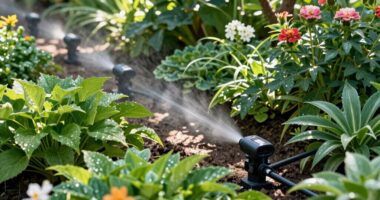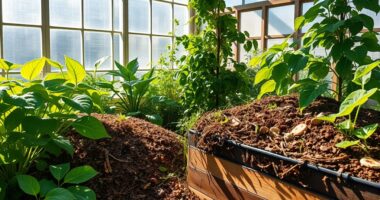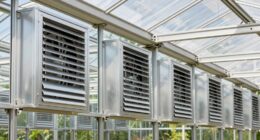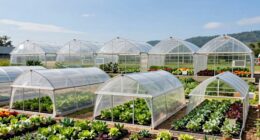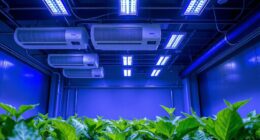In your greenhouse, creating a closed loop composting system transforms organic waste like plant scraps and coffee grounds into nutrient-rich compost that boosts your soil. By layering waste, maintaining moisture, and turning the pile regularly, you improve soil structure, promote healthy plants, and reduce waste sent to landfills. This eco-friendly cycle enhances plant resilience and minimizes environmental impact. Keep exploring to discover how to perfect this sustainable practice for your greenhouse success.
Key Takeaways
- Collect organic waste like plant scraps and coffee grounds to generate nutrient-rich compost within the greenhouse.
- Layer and regularly turn compost materials to maintain aeration and optimal decomposition conditions.
- Use mature compost to enrich greenhouse soil, enhancing fertility and plant health naturally.
- Maintain a balanced compost system to suppress pests and diseases, reducing reliance on chemical controls.
- Establish a sustainable cycle by continuously recycling organic waste, creating a self-sufficient, closed-loop greenhouse environment.

Have you ever considered turning your greenhouse waste into a valuable resource? Composting in your greenhouse offers an excellent way to do just that. By converting plant scraps, coffee grounds, and other organic materials into nutrient-rich compost, you create a sustainable cycle that benefits your plants and the environment. When you compost properly, your soil becomes inherently more fertile through soil enrichment, which improves plant health and yields. The compost supplies essential nutrients like nitrogen, phosphorus, and potassium directly to your plants, reducing the need for chemical fertilizers and supporting organic gardening practices.
Transform your greenhouse waste into nutrient-rich compost for healthier, more productive plants.
Plus, composting helps you manage waste efficiently, minimizing the amount of organic matter sent to landfills, where it would produce methane—a potent greenhouse gas. Instead, you’re transforming waste into a resource that boosts soil vitality. As the compost matures, it also contributes to better soil structure by increasing its ability to retain moisture and air, which are critical for healthy root development. This improved soil quality leads to stronger plants that are more resilient against pests and diseases.
Speaking of pests, composting can play a role in pest control, especially when you maintain a healthy, balanced compost pile. By composting plant material properly, you discourage harmful pests that often thrive in decaying, unmanaged waste. A well-maintained compost pile heats up during the thermophilic phase, destroying weed seeds and pathogen spores that might otherwise harm your crops. This natural process reduces the likelihood of pest infestations and plant diseases, helping you grow stronger, healthier plants without relying heavily on chemical controls.
In fact, compost can even promote beneficial organisms in your greenhouse soil, such as predatory insects and microorganisms that keep pest populations in check. These beneficials help create a balanced ecosystem where pests are naturally kept at bay. Additionally, incorporating compost into your greenhouse soil enhances its overall health, making plants less susceptible to pest attacks because healthy plants are better equipped to resist pests and diseases.
Getting started with composting in your greenhouse is simple. Layer organic waste, carbon-rich materials like straw or shredded paper, with nitrogen-rich scraps like vegetable peelings. Keep the pile moist and aerated, and turn it regularly to maintain ideal decomposition. In time, you’ll develop a rich, dark compost that can be mixed into your soil, creating a closed-loop system that sustains itself.
Frequently Asked Questions
Can Composting in a Greenhouse Attract Pests?
Yes, composting in a greenhouse can attract pests if you’re not careful. To prevent this, focus on pest prevention by choosing an appropriate compost bin placement away from plant beds and entry points. Regularly turn and monitor your compost to avoid odors and pest attractants. Keeping the compost moist but not too wet, and avoiding meat or dairy, also helps reduce the risk of pests.
What Temperature Is Ideal for Greenhouse Composting?
Think of your compost like a symphony—temperature regulation is key. Aim for 135-160°F (57-71°C) to foster ideal microbial activity, breaking down materials efficiently. This temperature range keeps pests and odors at bay while accelerating decomposition. Regularly monitor your compost to maintain these heat levels, ensuring a healthy, active process that transforms waste into valuable soil, just as a conductor guides a harmonious performance.
How Long Does It Take to Produce Compost in a Greenhouse?
The composting duration in your greenhouse typically takes around 4 to 8 weeks, depending on conditions. Greenhouse compost speed benefits from ideal temperature, moisture, and aeration, which can accelerate the process. Regular turning and maintaining the right environment help speed up composting, ensuring you get nutrient-rich compost quicker. By managing these factors, you can efficiently produce compost in your greenhouse within the expected timeframe.
Is Special Equipment Required for Greenhouse Composting?
You don’t need fancy composting equipment for your greenhouse setup, but having the right tools makes all the difference. A simple compost bin or tumblers work well, and you might consider a compost turner for easier aeration. With the right equipment, you’ll save time and effort, turning waste into valuable soil faster. It’s a case of “cutting corners” when you skip proper gear, so invest in what suits your needs.
How Do I Prevent Odors in Greenhouse Compost Bins?
To prevent odors in your greenhouse compost bins, guarantee good air circulation by regularly turning the compost and using vents or fans. Layer browns and greens properly to balance moisture and aeration, which aids odor control. Avoid overfeeding the bin with wet or high-nitrogen materials, and keep the lid closed but not airtight. These steps promote aerobic decomposition, reducing unpleasant smells and maintaining a healthy, odor-free composting environment.
Conclusion
By composting in your greenhouse, you’re not just recycling scraps—you’re transforming your space into a powerhouse of endless, free fertility that could grow an entire jungle! Imagine turning waste into a magic potion that fuels your plants’ growth so furious, they’ll practically leap out of the pots. Embrace this closed-loop system, and you’ll discover the secret to unstoppable, garden-defying abundance—your greenhouse will become a lush paradise that rivals nature itself!



